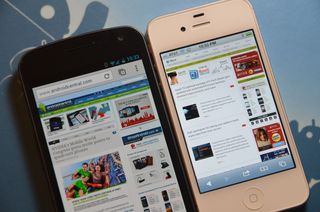iOS holds steady behind Android platform market share in Q1 2012

IDC released their quarterly report on worldwide smartphone market share by operating system today, and the chart looks more or less as you'd expect: Android has kept ballooning (59% market share), while iOS maintained a respectable second place (23%), while Symbian (6.8%) and BlackBerry (6.4%) continued their downward spirals. Windows Phone growth saw decent 26.9% growth since last year, but that still only amounts to 2.2% market share. All in all, 152.3 million smartphones were shipped in Q1 2012, which is 49.9% more than the same quarter in 2011.
With these trends continuing, it won't be long before BlackBerry and Symbian barely even show up on the radar and the smartphone game becomes a two-horse race - some would argue it already is. Between Apple and Google's operating systems, 80% of the world's smartphones are accounted for. I'm really curious to see if Windows Phone can manage to claw enough mindshare to become a viable third option, but it seems more likely that it will be a bit player just like RIM. It's interesting to see that even after a year of Nokia announcing its retirement Symbian it's still commanding the market share that it is. Despite the nosedive, BlackBerry hasn't managed to squeak up over Symbian market share, and at the going rate, they probably won't be able to swing it next quarter either. IDC actually had some advice for those lower on the food chain.
In order for operating system challengers to gain share, their creators and hardware partners need to secure developer loyalty. This is true because developer intentions or enthusiasm for a particular operating system is typically a leading indicator of hardware sales success.
That's true enough, but not many developers are willing to invest in platforms that don't have the hardware sales unless the manufacturers are paying them off. What comes first: manufacturers making phones people want to buy, or developers that make phones into things people want to buy? It seems like in the case of iPhone, it's the latter; out of the box it does pretty much everything any other smartphone can (admittedly with a great deal of polish) but it's the App Store that really gets buyers invested in iOS. That said, Android's app ecosystem isn't exactly healthy when you consider piracy and fragmentation, but the hardware manufacturers are able to address a much wider variety of tastes and needs. Should competitors be picking up Android's approach or that of iOS in order to snag third place?
Source: IDC
Master your iPhone in minutes
iMore offers spot-on advice and guidance from our team of experts, with decades of Apple device experience to lean on. Learn more with iMore!
Editor-at-very-large at Mobile Nations, gamer, giant.
Most Popular



